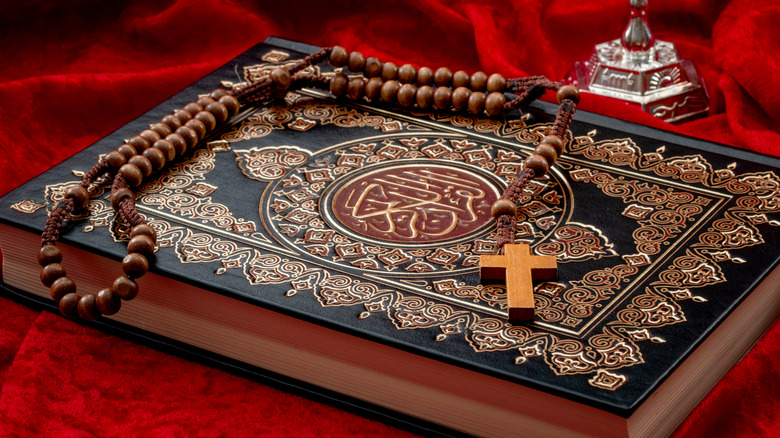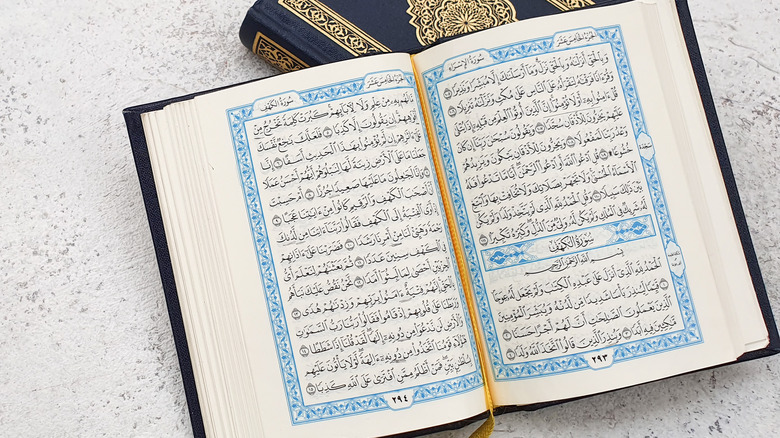What's The Difference Between The Bible And The Quran?
In 2015, the two largest religions in the world, according to Pew Research Center, were Christianity and Islam. Collectively, the two faiths comprised about 4.1 billion people, with the former claiming 2.3 billion adherents, the latter 1.8 billion. Both religions, along with Judaism, are Abrahamic, according to The British Library, which means that all three regard the patriarch Abraham as a major figure, and the narrative of his life is part of the historical and doctrinal basis for the religion.
Christianity, Judaism, and Islam are also all based on revealed text, according to Northern Arizona University, each with its own "book." For Jews, it's the Old Testament (the first five books of which are referred to within Judaism as the Torah, according to My Jewish Learning); for Christians it's the Bible (Old and New Testaments); and for Muslims it's the Quran. Despite the Quran and the Bible informing somewhat similar religious contexts, the two books are different in length, scope, origin, and a handful of other areas.
The Quran and the Bible had different authors
When it comes to religious texts, there are two competing beliefs that inform the discussion. The traditionalist belief holds that any religious text was written by whomever that religion's dogma claims to have written it: Moses wrote the first five books of the Old Testament, the prophet Isaiah wrote the Book of Isaiah, St. Matthew wrote the Gospel of Matthew, and so on. The critical belief holds that any such text was probably written, edited, copied, or compiled by some anonymous person or group of people, and a name was eventually attached to it.
Both schools of thought effectively reach the same conclusion about the Bible: Regardless of the specifics, it was written by multiple men, in multiple regions, over hundreds of years, according to History. On the other hand, Islam traditionally holds that the text of the Quran was dictated to the prophet Mohammed by the angel Gabriel over the course of a couple of decades in the 7th century, according to Northern Arizona University.
The Bible is considerably longer than the Quran
As religious texts go, the Bible is a pretty thick one. Specifically, according to Word Counter, the text checks in at 800,000 or so words, depending on translation. That's roughly on par with, for example, the length of Stephen King's novel "The Stand." If you committed an eight-hour workday to reading the Bible, and took breaks, you could probably finish it in eight or so days.
The Quran, on the other hand, is considerably shorter. According to the website Study, the holy text of Islam is about 10% the size of the Bible, checking it at about 77,000 words (again, depending on translation). A committed reader could finish the entire text, from beginning to end, in the course of an afternoon.
This brevity informs how readers are expected to consume the text, according to Britannica. The Quran is divided further into 144 units called "surahs." These passages vary in length and, according to Quran for Kids, Muslims would do well to memorize certain surahs in the same way that Christians memorize certain verses or passages from the Bible.
The Bible is multiple literary genres, while the Quran is one
As a collection of disparate texts written in different centuries by different individuals (and in some cases, writing in different languages), the Bible does not consist of any one type of literary genre, as Bible Gateway notes, but rather, multiple genres. Much of the document is narrative — a recitation of events, such as you would read in a history book. However, the text also includes books of prophecy, poetry, law, and the like.
By comparison, the Quran was written in only one literary style. It exists both within and without the normal conventions of the Arabic language, according to the website of Hamza Andreas Tzortzis, and it is neither poetry nor prose. Egyptian academic Taha Husayn (quoted by Tzortzis) described it as a literary genre unto itself. "The Qur'an is not prose and that it is not verse either. It is rather Qur'an, and it cannot be called by any other name but this ... It has been one of a kind, and nothing like it has ever preceded or followed it," Husayn wrote.



